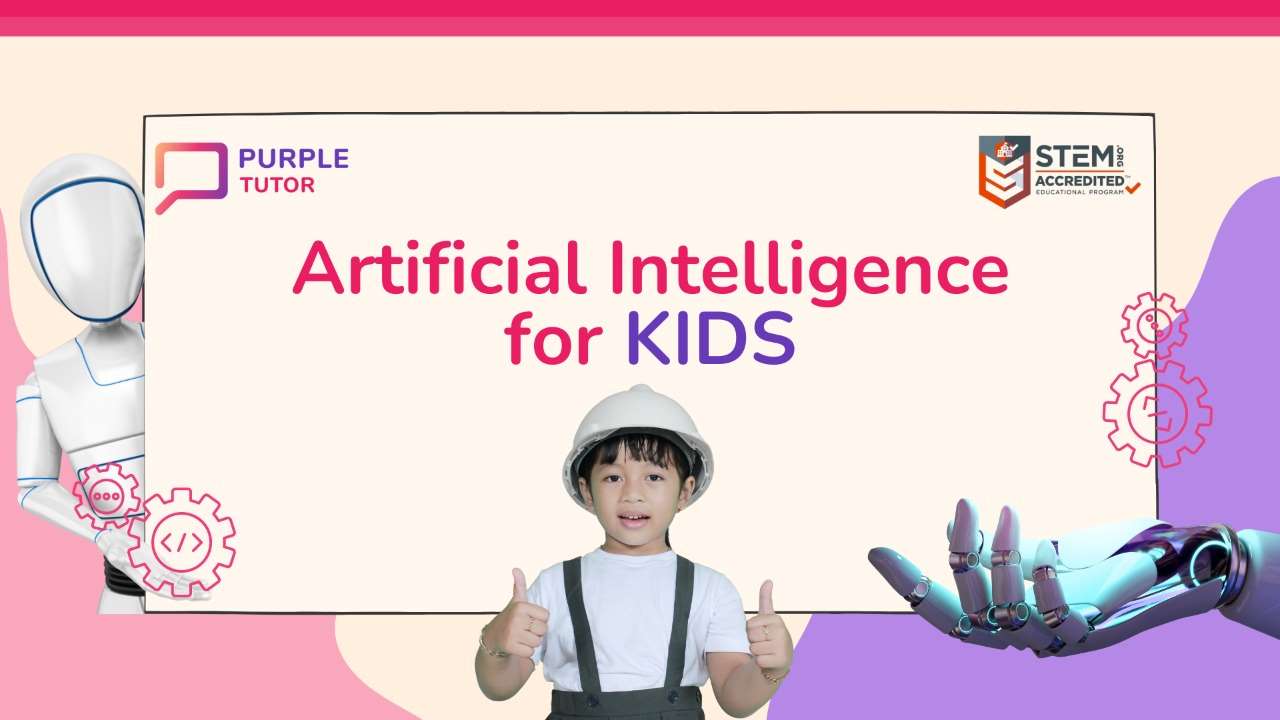Easy Ways to Learn Artificial Intelligence (AI) for Kids

Artificial Intelligence (AI) is the most happening technology in the world. It is a part of daily life for most of the people around the globe. From smart virtual assistants like Alexa, Siri, and self-driving cars to checkout-free grocery shopping, AI is becoming a deep part of human life. In this technologically advanced world, it becomes important for kids to learn about artificial intelligence and machine learning at an early stage. Read this article to know about artificial intelligence for kids.
What is Artificial intelligence (AI)?
Artificial intelligence, or AI, is the ability of a computer or machine to perform tasks that normally require human-like intelligence. This means that they can do things that normally require human-like thought, such as understanding language, recognising patterns, and making decisions.
There are many different types of AI, ranging from simple to complex. Some examples are as follows –
Machine learning – A type of AI that enables a computer to learn from data without being explicitly programmed
Natural language processing – A type of AI that enables a computer to understand, interpret, and generate human language
Computer vision – A type of AI that enables a computer to interpret and understand visual data from the world around it
Expert systems – A type of AI that uses a combination of machine learning and human-generated rules to make decisions or solve problems

What is Intelligence?
Intelligence is the ability to acquire and apply knowledge and skills in order to solve problems, make decisions, and adapt to new situations. It involves a range of cognitive abilities, including memory, attention, perception, language, problem-solving, and critical thinking. Intelligence is often measured through intelligence tests, which are designed to assess these cognitive abilities.
Intelligence is a complex and multifaceted concept, and there is no single definition that captures all of its aspects. Some experts define intelligence as the ability to adapt to and learn from new environments, while others see it as the ability to process and manipulate information. Still others view intelligence as the ability to think abstractly or creatively.
Intelligence is not fixed and can be developed and improved through learning and experience. It is also influenced by a variety of factors, including genetics, environment, and education.
>
Artificial Intelligence Activities For Students
Here are some activities that students can do to learn about artificial intelligence (AI) –
Build a chatbot – Students learn to create a chatbot that can answer questions and hold basic conversations with users. This activity helps students learn about natural language processing, a type of AI that enables computers to understand and interpret human language
Create a simple machine learning model – Students build a simple machine learning model that can recognise patterns in data. This activity help students understand how machine learning works and how it can be used to make predictions based on data.
Design an expert system – Students can create a simple expert system, which is a type of AI that uses a combination of machine learning and human-generated rules to make decisions or solve problems. This activity help students learn about the principles of artificial intelligence and how it can be applied to real-world problems
Analyse the ethical and social implications of AI – Students learn to research and discuss the potential ethical and social issues raised by AI, such as the potential for job displacement or the risks of biased or discriminatory decision-making.
Explore AI-powered tools and applications – Students explore and experiment with different AI-powered tools and applications, such as voice assistants or image recognition software, to learn about the practical applications of AI
Need of Learning Artificial Intelligence for Kids
- AI has the potential to change kids’ thinking-pattern and style because the projects they work on allows them to start finding the reasons behind every research
- Learning AI involves boosting creative thinking in students at an early age
- Kids create new strategies to solve problems effectively
- It enhances activity skills in kids
- Due to growing technology, future jobs are concerned with artificial intelligence. So learning AI it will increase their selection chances because of their extraordinary abilities and skills
Conclusion
Purple Tutor offers artificial intelligence courses for kids of all ages developed by IIT graduates. In the course, students learn major ideas of AI and they build interesting projects. Thousands of students from across the countries have joined Purple Tutor, and you can be the next!
Frequently Asked Questions (FAQs)
1. Can I try a free class?
A: Yes. the first demo class is free of charge. You can book the free class from the booking link.
2. What are the courses that Purple Tutor offers?
A: Purple Tutor provides Cutting edge courses to make your child future ready. We have courses like – Python, Web Development, Artificial Intelligence, Machine Learning, Cyber Security, & Roblox Games.
3. Is the coding course schedule flexible?
A: The courses for kids are flexible. You can select any time and any day that works around your child’s schedule.
4. How do I know what coding course is right for my kid?
A: The teachers assess the level of the student in the demo class on the basis of which the course is suggested.
5. Will my child receive a certificate?
A: Students get certificated after completion of each course. The certificate recognises the skills the student learnt and the level of mastery achieved.
6. What do you require to learn coding from Purple Tutor?
A: You need a laptop/computer with a webcam and a stable internet connection.
7. What level will my kid reach in coding expertise after completing your course?
A: Kids learn everything about coding that exists in their courses. They will learn basic programming concepts, algorithms, sequencing, writing code to solve puzzles, projects, geometric patterns, etc. According to the course undertaken, kids will learn as per the curriculum.